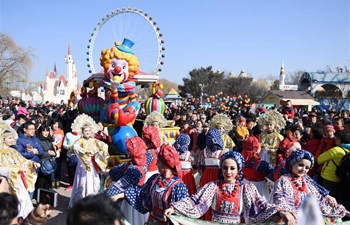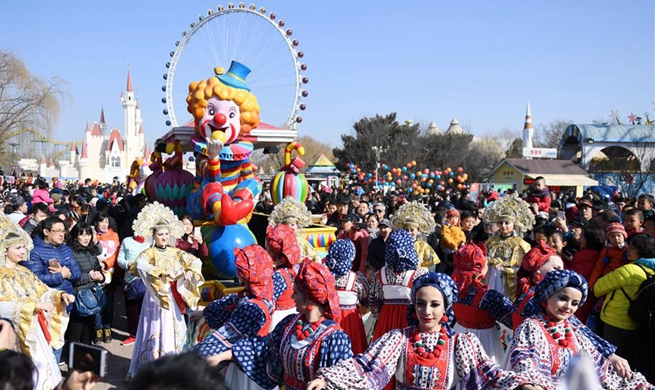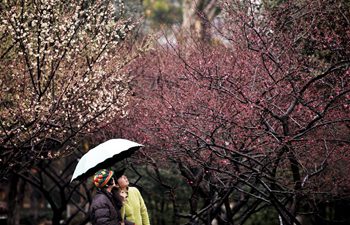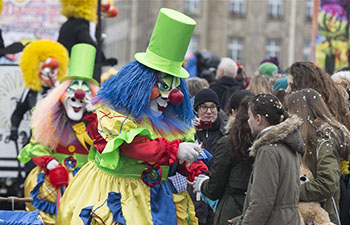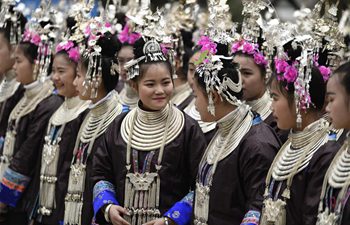By Tao Jun, Bui Long
HANOI, Feb. 21 (Xinhua) -- In Vietnam's first national university on Tuesday, the fifth day of Tet (Lunar New Year holiday), thousands of people stood packed in a long queue, patiently waiting to be given Chinese words written on red paper.
The complex of Van Mieu (Temple of Literature) and Quoc Tu Giam (Imperial Academy), Vietnam's first national university built in the 1070-1076 period, received over 35,000 visitors a day in the weeklong Tet, which wrapped up on Tuesday.
On Tuesday alone, the complex in the capital city of Hanoi welcomed nearly 40,000 visitors, partly because of the lure of the Spring Calligraphy Festival.
The festival is taking place inside and outside the complex from Feb. 9 to 25 with the participation of 63 professional and amateur calligraphers, Le Xuan Kieu, Director of the Center for Scientific and Cultural Activities of Van Mieu-Quoc Tu Giam, told reporters.
Among the visitors, many queued up for around two hours to approach calligraphers to ask them to write specific words on red paper. After the calligraphic works are finished, word-seekers placed the red paper on ornamental trees and waited for half an hour until the ink on the paper was dry.
It seems that such works of calligraphy hold an indispensable spiritual importance for many Vietnamese people, particularly during Tet. Typically, people passionately ask the calligraphers to write one or two big words in Chinese or Vietnamese on red paper (red symbolizes luck), and carefully bring the paper home and solemnly hang it on the wall. This is an age-old tradition of many Vietnamese people in the first days of the Lunar New Year.
The tradition reflects Vietnamese people's respect and thirst for knowledge and studies, as well as their wishes for the new year. The words they seek can express or expose their thoughts, hearts and characters.
"Most people seek one of three words, namely "Duc" (Virtue, Righteousness), "Phuc" (Blessing) and "Tam" (Heart). "We can infer that they like or want to lead a decent life," Vietnamese calligrapher Tran Dinh Cuong, told Xinhua on Tuesday.
More and more people are seeking the word "Nhan" (Patience), which proves that they realize the importance of being patient in peacefully handling issues and problems in daily life, the grey-haired calligrapher wearing a black traditional tunic added.
Businesspeople or those who want to make more money often seek the words "Loc" (Wealth), "Phat" (Prosperity) or "Tin" (Creditability). The elderly like the word "Tho" (Longevity). Meanwhile, students mostly seek the words "Do" or "Do Dat" (Pass exams), "Thanh Dat" (Successful), "Tri" (Intelligence, Wisdom) or "Dang Khoa" (Graduate).
"Tell me the word you are asking for, I will tell you who you are," another calligrapher named Bui Chinh Hung said, smiling. According to him, people who seek fine and meaningful words tend to do right things, or at least try to do so.
Many grade students go to Van Mieu-Quoc Tu Giam and seek such words as "Do Dat", "Tri" and "Dang Khoa", which clearly exhibits their hope for good exam results in particular or good academic performances in general, and slightly exposes their determination for acquiring knowledge.
"I queued up for nearly two hours to seek the word "Do Dat." I hope that I will pass the coming entrance exam to be admitted to the National Economics University," Tran Thanh Huyen from Tran Phu Senior High School in Hanoi, told Xinhua on the second day of Tet.
Standing next to the cute, bright-faced, 18-year-old girl was a short-sighted girl named Nguyen Gia Han from Thinh Quang Junior High School in the city. "I asked the calligrapher to write the word "Tri" (Intelligence, Wisdom) for me. I will pursue "Tri Thuc" (Knowledge). "Tri Thuc La Suc Manh" (Knowledge Is Power)," Han said confidently.
Thanks to the strong interest of Vietnamese people from all walks of life in calligraphy, local calligraphers now gather in specific areas in Hanoi and Ho Chi Minh City.
The most well-known "Calligraphers' Street" is the Literature Lake area in front of the Temple of Literature, where calligraphers make money from their works after years of pursuing calligraphy as a hobby.
This year, word-seekers often pay 150,000-300,000 Vietnamese dong (6.6-13.2 U.S. dollars) for one or two big words written on red paper, up from around 100,000 Vietnamese dong (4.4 U.S. dollars) last year. A famous calligrapher, often old and good at Chinese, can write around 1,000 words a day during Tet.
"Many people opt for calligraphers who have a good command of Chinese despite the fact that Vietnamese calligraphy is also beautiful and becoming more and more popular," a local banking expert told Xinhua on Tuesday.
"I prefer Chinese calligraphy because the Chinese characters look more mystical and like pictures," Nguyen Thanh Lam added, noting that his last name "Lam" (Forest) looks like two trees standing shoulder-to-shoulder when it is written in Chinese.







